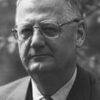Category: Evangelical Calvinist
Writings from the blog: Athanasian Reformed (aka The Evangelical Calvinist). Senior Reformed scholars present a coherent and impassioned articulation of Calvinism for today’s world.
The Seed of the Classical Theistic God Given Blossom in the god of Modern Atheism
I have been an oft critic of the ‘classical theistic’ god. The classical theistic God is typically known by actus purus, ‘pure being.’ I have argued that this conception of Godness as Monad comes to us from the ancient Greek philosophers, and not from God’s Self-revelation of Himself in Jesus Christ. Some would say that my argument is modern, but that would simply be the chronological snobbery fallacy. Truth has no provenance; that is, truth is truth no matter where or whence it comes. Bruce McCormack describes this sort of critique this way (here his comments are in the context of his treatment on Eberhard Jüngel’s explication…
A Very Theological Proposal: Gratitude as the Ground for What it Means to be Human, Coram Deo
“What is man that thou are mindful of him . . . ?” King David, as he stood before the grandeur of God, as He reflected upon God’s handiwork in creation, asked an age-old question, with reference to the who of humanity. In this instance, he wasn’t necessarily attempting to peer into the entailments of a theological anthropology, but instead simply standing in awe at the bigness of God relative to God’s compassion for us small little human beings here on the flatland. For the rest of this piece, I want to think about what it means to be human…
The Gospel is Christ-concentrated not Hell-concentrated, per se
The Gospel is not “hell-forward.” Indeed, the Gospel is God’s Grace-forward in the face of Jesus Christ. When proclaiming the Gospel the proclaimer ought to proclaim Christ first (God’s love all the way down for them), and explain that the Gospel is about what God has done, is doing, and will do for them in the free life of Jesus Christ. When speaking about sin, and its consequences, the proclaimer ought to place an emphasis on God becoming sin for us that we might become the righteousness of God in Him [in Christ]. This way the focus of salvation emphasizes…
On Migrating the Blog?
I am contemplating making the jump to a different host for my online writing. WordPress, my current host, has become more focused on commercial websites than on blogging these days. My concern is that WordPress may discontinue support for blogging all together someday, and I’ll be out to lunch. Substack seems to offer the best alternative. It’s services are free (here I pay a minimal amount for ad free posting), and it offers a built in network and community. It also operates off of a newsletter premise, so when you subscribe you receive my post directly as newsletter recipients (I…
This Blog is Archived: See You at bobbygrow.substack.com
I have decided to migrate over to Substack, as I was contemplating in my last post. I will leave this blog up, of course!, with all of its archives intact. I have exported all of my posts, and I believe comments, over to my Substack (I think it is still in the process of processing all of that). I hope all of my readers and subscribers will follow me over to my new online writing home. It will still be the same type of material as I’ve engaged with here over the years, just on a different platform (with I…
The Free Grace of God Counterposed with a Law Based Grace
How does the Christian know the depth of sin; how does anyone? How does a Christian have knowledge of themselves; how does anyone? According to Scripture we only know the depth of human sin through God’s Self-revelation in Jesus Christ. To think sin, to think humanity even, from any other ground than the ground of God’s Light of Light for the world in Jesus Christ will give us a skewed sense, a perverted perspective on just who we are as fallen humanity. Until we come to the realization and understanding of the depth dimension of our status as fallen creatures,…
A Confession on Spiritual Doubt
Even as a Christian, nearly 30yrs ago, I went through a season of extreme spiritual and intellectual doubt. It was as if the heavens were bronze, as if closed. That in my attempt to think and talk with God, it felt as if my words and thoughts would only make it as high as this bronze ceiling; as if the God I was ostensibly worshipping was merely a projection of my own wants and wishes. But I came to realize—through God’s grace and persistence—that in fact the Heavens are always open; indeed, that the veil of the flesh of Christ’s…
No One But God is Good: And Its Implications for Modern People
Some people confuse the Enlightenment for the New Creation. To the point that the human spirit has come to a crossroads in its development, and become civilized, or good. But this is not what the Gospel says. The Gospel says that we are constantly being given over to the death of Jesus that His life might be made manifest through the mortal members of our bodies. This presupposes that as Martin Luther rightly emphasized, as Christians, we are simul iustus et peccator (simultaneously justified and sinner) while we continue to inhabit this in-between time within our bodies of death. The…
Jesus, the Israel of God
I was going to write a post on Jesus as the Israel of God; on Jesus as the new humanity of God, who in fact is the Son of David, in all the scandalous particularity that ought evoke. But as I began to index the various passages I might use to make this case I thought it more organic to simply lay them out, with the emboldened sections intended to highlight how I might make the case for Jesus as Israel. He is not some transcendent extra, some Gnostic ethereal demiurge, some link between heaven and earth (as merely an…
On Reading Scripture as a Foreigner
Reading Holy Scripture is an exceedingly dialogical event. That is to say, reading Scripture takes place in the relationship that co-inheres between the divinity and humanity of Jesus Christ for us; it is a con-versational happenstance that reposes in the context of God’s eternal and triune life. This entails that as the Christian reads the Bible they are engaging in an organic and inter-personal contact with the very author of said readings. As Jesus said: He would not leave us as orphans, but send us the Holy Spirit; the Comforter, the come-along-sider who will bring us into all truth; who…







